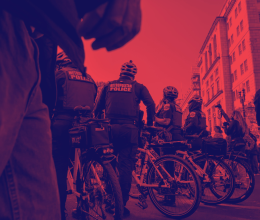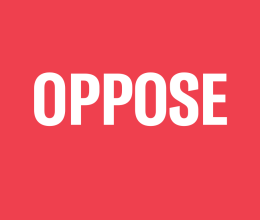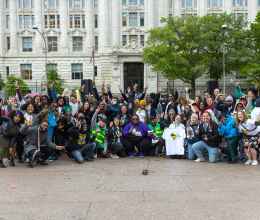Statement on behalf of the
American Civil Liberties Union of the District of Columbia
before the
D.C. Council Committee of the Whole
Hearing on
Bill 24-946 – B24-49 – “Street Vending Decriminalization Amendment Act of 2021” and
B24-50 – “Sidewalk Vending Zones Amendment Act of 2021”
by
Ahoefa Ananouko, Policy Associate
November 16, 2022
Hello Chairman Mendelson and members of the Council. My name is Ahoefa Ananouko and I am a Policy Associate at the American Civil Liberties Union of the District of Columbia (ACLU-DC). I present the following testimony on behalf of our more than 15,000 members and supporters across the District.
The ACLU-DC works to dismantle systemic racism and advocates for sensible, evidence-based public policy solutions that safeguard fundamental liberties and rights of District residents. The criminalization of unlicensed street vending in the District has resulted in police harassment, arrests, and violence against D.C. residents who are simply trying to provide for their families. Policing of street vending disproportionately targets and harms Black and brown district residents—who are already overpoliced. It contributes to these communities feeling unsafe, and makes undocumented D.C. residents susceptible to federal immigration enforcement, violating D.C.’s obligation as a self-proclaimed “sanctuary jurisdiction”.
The Council Should Pass B24-49
The ACLU-DC strongly supports Bill 24-49, the “Street Vending Decriminalization Amendment Act of 2021,” and we urge the Council to pass this measure as soon as possible. Passing B24-49 would be a significant step towards reducing police interactions with street vendors—ensuring that vendors can feel safe while pursuing their livelihoods without threats to their safety and wellbeing.
Under current District law, street vending is a misdemeanor crime punishable by a fine up to $500, imprisonment of up to 90 days, or both. B24-49 would remove these criminal penalties for vending without a license.
According to data from the D.C. Sentencing Commission, there were 463 arrests “illegal” vending, made up of 498 unique vending charges, between January of 2018 and September of this year. Seventy-eight percent (78%) of those charges were for vending without a license. Additionally, most of these arrests resulted in a post-and-forfeiture, which means vendors were forced to give up hard-earned resources that they strongly depend on for survival.
Street vending is not, in and of itself, inherently dangerous and does not pose any immediate threats to public safety, therefore, it should not be considered a crime warranting criminal penalties. The current law puts street vendors at risk of harm by increasing hostile interactions with law enforcement. Criminalization takes away a sustainable means of income for street vendors and contributes to the continued erosion of trust in police, because the current law allows them to become agents of harm. Further, appropriating police resources to enforcing current street vending laws is not only misguided, but not the best use of those resources.
This carceral approach to street vending regulation disproportionately targets Black and brown district residents, who are most likely to suffer the long-term effects of police violence and a criminal record. Of the 463 vending-related arrests made between 2018 and September 2022, the majority (81%) were of Black individuals.
There is acute risk of significant consequences for vendors who are immigrants and/or formerly incarcerated—individuals who tend to be shut out of formal forms of employment due to their status. As decades of experience and data continue to show, the collateral consequences of an arrest or conviction are far-reaching, including limited access to occupational licenses and other employment opportunities, housing, education, and social services.
The increased chances of police interaction places undocumented vendors at heightened risk for negative immigration proceedings, even if they are not ultimately charged or convicted. This makes vendors with pending immigration status or proceedings susceptible to deportation. Just simply being arrested can trigger a response from federal immigration agencies such as ICE. Immigration court judges, who have wide discretion in immigration cases, could use a conviction for vending without a license to determine that a person should not be awarded immigration status. As a “Sanctuary City” D.C. should be doing everything in its power to protect its immigrant residents. And criminalizing street vending is contrary to that commitment, as it directly puts undocumented vendors in harm’s way.
Over the last few years, street vendors have come before the Council to testify and recount traumatizing stories of harm by police for no other reason than selling goods on the streets without a license. During the Judiciary Committee’s 2022 performance oversight hearing for the Metropolitan Police Department (MPD), street vendors from Vendedores Unidos/Vendors United, a D.C. street vendor co-op, testified about continuous harassment and intimidation from police. These witnesses include Genesis Lemus who recalled a 2019 experience she and her younger brother had with MPD officers while the two young people were selling snacks on the street. The encounter led to Lemus sustaining a knee injury.
Another vendor, Tity Bangura, testified about being arrested and jailed on nearly a dozen occasions and the poor treatment she received during these instances. She described her personal items and money being taken and not returned, and not being provided food or water for days while in detention. Astonishingly, just moments before giving her testimony that very day, Bangura and the mother of Genesis were being harassed by police officers, who threatened to arrest them, after the two had a small skirmish over vending space.
The experiences of Tity Bangura and the Lemus family are not unique. Many vendors report being repeatedly targeted and even being followed home by police officers. Vendors (including children) have also spoken out about verbal abuse and physical assault by law enforcement agents, police officers confiscating or throwing away their food or belongings in the trash, and threatening to separate children from their parents by reporting parents whose children also engage in street vending to Child and Family Services. These experiences not only instill fear in the vending community, and by extension the larger communities they live in, but engender distrust of law enforcement.
Recognizing the potential for these adverse impacts of policing street vending, the Criminal Code Reform Commission, which was created and tasked with conducting a comprehensive review and modernization of the District’s criminal code, recommended that §37-131.08(b) of the D.C. Code be repealed (the same change proposed by B24-49). Additionally, the Police Reform Commission also recommended the Council decriminalize low-level offenses, including illegal vending.
D.C. would not be the first jurisdiction pondering major changes to its street vending laws. In 2018, former California Governor Jerry Brown approved the “Safe Sidewalk Vending Act.” The bill decriminalized street vending across the state, required that vendors only be cited with civil fines instead of criminal penalties (and requires adjudicators to consider a person’s ability to pay), and that any criminal prosecutions related to street vending under local ordinances be dismissed. The bill recognized that “Sidewalk vending provides important entrepreneurship and economic development opportunities to low-income and immigrant communities; increases access to desired goods, such as culturally significant food and merchandise; contributes to a safe and dynamic public space; and that prohibiting criminal penalties for violations of sidewalk vending ordinances and regulations promote safety and welfare of the general public.”
A few notable aspects of the California bill include barring cities and counties from banning vending in parks; prohibiting jurisdictions from determining where vendors can operate, unless there is a health, safety, or welfare concern; and not requiring street vendors to get permission from adjacent businesses to operate in an area.
Efforts are also currently underway in New York to improve New York City’s street vending infrastructure. Senate Bill S1175B would decriminalize street vending and change New York City laws to require the city to adopt a program that regulates street vending and stand up a civilian body to oversee regulation.
Provisions in B24-50
The ACLU-DC also supports provisions in B24-50, the “Sidewalk Vending Zones Amendment Act of 2021,” which would expand access to licensing for vendors, as the criminalization of street vending cannot be separated from its regulation. B24-50 would, among other things, “allow the Mayor to establish sidewalk vending zones for sidewalk vendors to legally operate … and waive unpaid licensing-related civil citations for sidewalk vendors who obtain a sidewalk vending zone individual license or registers with a sidewalk vending zone manager.” Unlicensed vending would still remain a civil infraction enforced by the Department of Consumer and Regulatory Affairs (DCRA).
While the two licenses give vendors additional avenues to be licensed, B24-50 does not appear to address the structural barriers that exist within the current licensing system, another critical issue vendors face.
Vendors and advocates describe the process for obtaining a vending license from DCRA as complex and inaccessible. Street vendors want to comply with District laws. However, the high cost of licensing and the complicated maze of rules that regulate sidewalk and street vending create a barrier to entry for most vendors. The upfront cost of obtaining a sidewalk vending license and other necessary permits is about $2,000, while the annual fee for a site permit is $600. Vendors are also required to pay $375 in sales tax quarterly, regardless of whether they are vending or not. In addition, vendors can face infraction fines ranging from $50 to $16,000, depending on the class. DCRA can deny license or renewal applications of individuals who have been convicted of vending without a license, even if they have paid fines. This presents a challenge for vendors who would like to go through “the proper channels,” and gives DCRA enforcers and MPD officers justification for intimidating and hassling street vendors.
The current version of B24-50 does nothing to address the exorbitant fees which present a hurdle for a lot of vendors.
To address this, we encourage the Council to further examine DCRA’s regulatory licensing requirements for street vending, in order to reduce the burden of licensure on vendors. The Council should ensure that new policies governing street vending do not continue or create new obstacles for vendors. In that vein, we also recommendation that the council follow the example of California by including a provision that requires consideration of a person’s ability to pay, when assessing fines.
As Councilmember Nadeau stated in her 2020 press release announcing B23-976 (the predecessor to B24-50), “Unlicensed vending is not a public safety issue and our response should not be to send armed police officers to enforce these regulations…” Criminalizing street vending is not a solution and is, in fact, unjust and counterproductive. Continuing to have criminal penalties for street vending only further destabilizes families who have been disproportionately impacted by the covid-19 pandemic.
The changes made by Bills 24-49 and 24-50 would be significant actions towards protecting street vendors from serious outcomes like harm from police, incarceration, and the collateral consequences of a criminal record, such as inability to access other jobs, services, or even deportation.
Although the Revised Criminal Code Act has passed, including the provision decriminalizing street vending, it does not go into effect until 2025. We urge the Council to pass and implement bills 24-49 and 24-50 as soon as possible to protect the rights of vendors, whose lives are at direct risk of harm if implementation is delayed.



